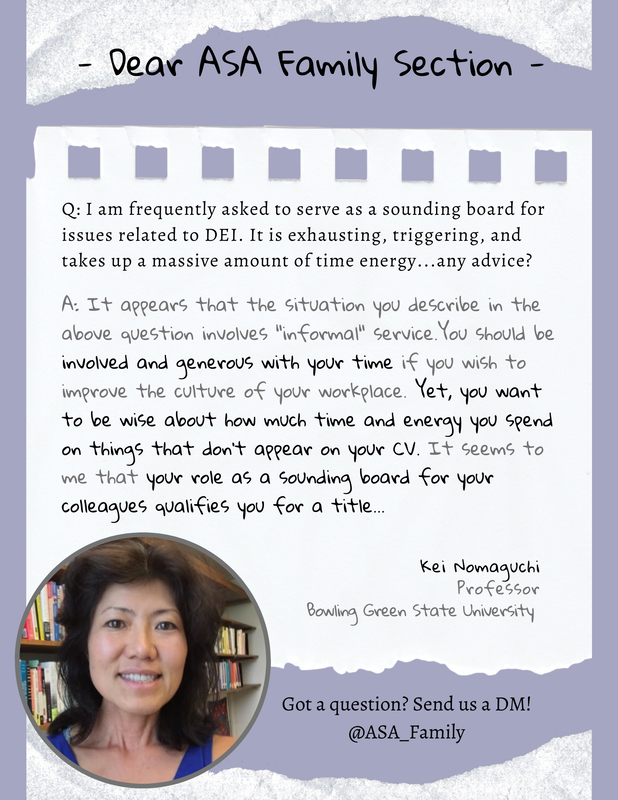|
This post is part of a new series from the Mentoring & Inclusion Committee called Dear ASA Family Section. It's a Dear Abby style Q+A where more advanced family sociologists answer questions from members.
Q: I am frequently asked by self-identifying white "allies" in my workplace to serve as a sounding board or "friend" with whom to discuss both personal and larger issues related to diversity, equity, and inclusion. It is exhausting, triggering, and takes up a massive amount of time and mental and emotional energy. This has always been an issue but has gotten so much worse over recent years. I also happen to be a junior faculty member, a woman, and not white. Does anyone have any advice for (1) avoiding/setting boundaries so that this doesn't happen as frequently, and (2) extricating oneself from these dynamics and relationships? Kei Nomaguchi Professor of Sociology Bowling Green State University A: In recent years, many organizations—academic, business, and nonprofit—have included Diversity, Equality, and Inclusion (DEI) in their strategic planning. I think this is fantastic because it compels us to be thoughtful when selecting new hires, members of task forces and committees, and speakers for important events. Without this structure, people are prone to select others from within their social networks. Given this trend, I, a person of color, cannot help but think, "Am I a DEI hire?" whenever I receive a request to serve on or chair a committee. Yet, I came to the conclusion that it does not matter how I was chosen. I would be pleased to contribute to my organization or the professional community, and I will make every effort to broaden my horizons and collaborate with others while doing so. Do you receive too many requests to serve on committees? Then you should be selective. Consider whether accepting the position will strengthen your CV or professional network. After repeating similar committee tasks at similar levels, it's time for you to say no to these responsibilities and yes to leadership roles in these tasks. It appears that the situation you describe in the above question involves "informal" service. I would give you the same advice for any casual service. You should be involved and generous with your time if you wish to improve the culture of your workplace (or maintain it if it is already collegial). Yet, you want to be wise about how much time and energy you spend on things that don't appear on your CV. It seems to me that your role as a sounding board for your colleagues qualifies you for a title. You could suggest to your colleagues or your department chair that setting up an ad hoc committee with a few additional people from minority groups who can act as a "sounding board" for various DEI-related concerns would benefit the department's members. You could argue that your viewpoint and experience may not be applicable in all circumstances; it would be better if the department formed a committee with others who could bring in various perspectives and experiences.
0 Comments
Leave a Reply. |
|
